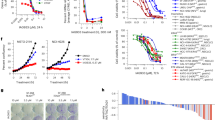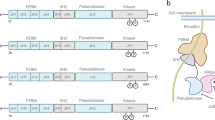Abstract
mTOR, the mammalian target of rapamycin, is a critical target of survival signals in many human cancers. In the absence of serum, rapamycin induces apoptosis in MDA-MB-231 human breast cancer cells. However, in the presence of serum, rapamycin induces G1 cell cycle arrest—indicating that a factor(s) in serum suppresses rapamycin-induced apoptosis. We report here that transforming growth factor-β (TGF-β) suppresses rapamycin-induced apoptosis in serum-deprived MDA-MB-231 cells in a protein kinase Cδ (PKCδ)-dependent manner. Importantly, if TGF-β signaling or PKCδ was suppressed, rapamycin induced apoptosis rather than G1 arrest in the presence of serum. And, if cells were allowed to progress into S phase, rapamycin induced apoptosis in the presence of serum. BT-549 and MDA-MB-468 breast, and SW-480 colon cancer cells have defects in TGF-β signaling and rapamycin induced apoptosis in these cells in the presence of either serum or TGF-β. Thus, in the absence of TGF-β signaling, rapamycin becomes cytotoxic rather than cytostatic. Importantly, this study provides evidence indicating that tumors with defective TGF-β signaling—common in colon and pancreatic cancers—will be selectively sensitive to rapamycin or other strategies that target mTOR.
This is a preview of subscription content, access via your institution
Access options
Subscribe to this journal
Receive 50 print issues and online access
$259.00 per year
only $5.18 per issue
Buy this article
- Purchase on Springer Link
- Instant access to full article PDF
Prices may be subject to local taxes which are calculated during checkout





Similar content being viewed by others
References
Baserga R, Peruzzi F, Reiss K . (2003). The IGF-1 receptor in cancer biology. Int J Cancer 107: 873–877.
Borel F, Lacroix FB, Margolis RL . (2002). Prolonged arrest of mammalian cells at the G1/S boundary results in permanent S-phase stasis. J Cell Sci 115: 2829–2838.
Chen CR, Kang Y, Massague J . (2001). Defective repression of c-Myc in breast cancer cells: a loss at the core of the transforming growth factor-β growth arrest program. Proc Natl Acad Sci USA 98: 992–999.
Chen Y, Rodrik V, Foster DA . (2005). Alternative phospholipase D/mTOR survival signal in human breast cancer cells. Oncogene 24: 672–679.
Chen Y, Zheng Y, Foster DA . (2003). Phospholipase D confers rapamycin resistance in human breast cancer cells. Oncogene 22: 3937–3942.
Fink SP, Mikkola D, Willson JK, Maekowitz S . (2004). TGF-β-induced nuclear localization of Smad2 and Smad3 in Smad4 null cancer cell lines. Oncogene 22: 1317–1323.
Fink SP, Swinler SE, Lutterbaugh JD, Massague J, Thiagalingam S, Kinzler KW et al. (2001). Transforming growth factor-β-induced growth inhibition in a Smad4 mutant colon adenoma cell line. Cancer Res 61: 256–260.
Foster DA . (2004). Targeting mTOR-mediated survival signals in anticancer therapeutic strategies. Expert Rev Anticancer Ther 4: 691–701.
Foster DA . (2006). Phospholipase D survival signals as a therapeutic target in cancer. Curr Signal Transduct Ther 1: 295–303.
Foster DA . (2007). Regulation of mTOR by phosphatidic acid? Cancer Res 67: 1–4.
Guertin DA, Sabatini DM . (2005). An expanding role for mTOR in cancer. Trends Mol Med 11: 353–361.
Hanahan D, Weinberg RA . (2000). The hallmarks of cancer. Cell 100: 57–70.
Ho A, Dowdy SF . (2002). Regulation of G(1) cell-cycle progression by oncogenes and tumor suppressor genes. Curr Opin Genet Dev 12: 47–52.
Inman GJ, Nicolas FJ, Callahan JF, Harling JD, Gaster LM, Reith AD et al. (2002). SB-431542 is a potent and specific inhibitor of transforming growth factor-β superfamily type I activin receptor-like kinase (ALK) receptors ALK4, ALK5, and ALK7. Mol Pharmacol 62: 65–74.
Jackson D, Foster DA . (2004). The enigmatic protein kinase Cδ: complex roles in cell proliferation and survival. FASEB J 18: 627–636.
Jackson D, Zheng Y, Lyo D, Shen Y, Nakayama K, Humphries M et al. (2005). Suppression of cell migration by protein kinase Cδ. Oncogene 24: 3067–3072.
Jaffe EM, Hruban RH, Canto M, Kern SE . (2002). Focus on pancreas cancer. Cancer Cell 2: 25–28.
Kalkhoven E, Roelen BA, de Winter JP, Mummery CL, van den Eijnden-van Raaij AJ, van der Saag PT et al. (1995). Resistance to transforming growth factor β and activin due to reduced receptor expression in human breast tumor cell lines. Cell Growth Differ 6: 1151–1161.
Law BK, Chytil A, Dumont N, Hamilton EG, Waltner-Law ME, Aakre ME et al. (2002). Rapamycin potentiates transforming growth factor β-induced growth arrest in nontransformed, oncogene-transformed, and human cancer cells. Mol Cell Biol 22: 8184–8198.
Lu Z, Hornia A, Jiang YW, Frankel P, Zang Q, Ohno S et al. (1997). Tumor-promotion by depleting cells of protein kinase Cδ. Mol Cell Biol 17: 3418–3428.
Luo J, Manning BD, Cantley LC . (2003). Targeting the PI3K-Akt pathway in human cancer: rationale and promise. Cancer Cell 4: 257–262.
Miyaki M, Kuroki T . (2003). Role of Smad4 (DPC4) inactivation in human cancer. Biochem Biophys Res Commun 306: 799–804.
Neshat MS, Mellinghoff IK, Tran C, Stiles B, Thomas G, Petersen R et al. (2001). Enhanced sensitivity of PTEN-deficient tumors to inhibition of FRAP/mTOR. Proc Natl Acad Sci USA 98: 10314–10319.
Perillan PR, Chen M, Potts EA, Simard JM . (2002). Transforming growth factorβ 1 regulates Kir2.3 inward rectifier K+ channels via phospholipase C and protein kinase C-δ in reactive astrocytes from adult rat brain. J Biol Chem 277: 1974–1980.
Podsypanina K, Lee RT, Politis C, Hennessy I, Crane A, Puc J et al. (2001). An inhibitor of mTOR reduces neoplasia and normalizes p70/S6 kinase activity in Pten+/− mice. Proc Natl Acad Sci USA 98: 10320–10325.
Popat S, Houlston RS . (2005). A systematic review and meta-analysis of the relationship between chromosome 18q genotype, DCC status and colorectal cancer prognosis. Eur J Cancer 41: 2060–2070.
Runyan CE, Schnaper HW, Poncelet AC . (2003). Smad3 and PKCδ mediate TGF-β1-induced collagen I expression in human mesangial cells. Am J Physiol Renal Physiol 285: F413–F422.
Sawyers CL . (2003). Will mTOR inhibitors make it as cancer drugs? Cancer Cell 4: 343–348.
Schmelzle T, Hall MN . (2000). TOR, a central controller of cell growth. Cell 103: 253–262.
Siegel PM, Massague J . (2003). Cytostatic and apoptotic actions of TGF-β in homeostasis and cancer. Nat Rev Cancer 3: 807–821.
Song K, Wang H., Krebs TL, Danielpour D . (2006). Novel roles of Akt and mTOR in suppressing TGF-β/ALK5-mediated Smad3 activation. EMBO J 25: 58–69.
van der Poel HG, Hanrahan C, Zhong H, Simons JW . (2003). Rapamycin induces Smad activity in prostate cancer cell lines. Urol Res 30: 380–386.
van der Poel HG . (2004). Mammalian target of rapamycin and 3-phosphatidylinositol 3-kinase pathway inhibition enhances growth inhibition of transforming growth factor-β1 in prostate cancer cells. J Urol 172: 1333–1337.
Zhong M, Shen Y, Zheng Y, Joseph T, Jackson D, Beychenok S et al. (2003). Phospholipase D prevents apoptosis in v-Src-transformed rat fibroblasts and MDA-MB-231 breast cancer cells. Biochem Biophys Res Commun 302: 615–619.
Acknowledgements
This work was supported by grants from the National Cancer Institute CA46677 and a SCORE grant from the National Institutes of Health GM60654. Research Centers in Minority Institutions award RR-03037 from the National Center for Research Resources of the National Institutes of Health, which supports infrastructure and instrumentation in the Biological Sciences Department at Hunter College, is also acknowledged.
Author information
Authors and Affiliations
Corresponding author
Rights and permissions
About this article
Cite this article
Gadir, N., Jackson, D., Lee, E. et al. Defective TGF-β signaling sensitizes human cancer cells to rapamycin. Oncogene 27, 1055–1062 (2008). https://doi.org/10.1038/sj.onc.1210721
Received:
Revised:
Accepted:
Published:
Issue Date:
DOI: https://doi.org/10.1038/sj.onc.1210721
Keywords
This article is cited by
-
TCTP protein degradation by targeting mTORC1 and signaling through S6K, Akt, and Plk1 sensitizes lung cancer cells to DNA-damaging drugs
Scientific Reports (2021)
-
Bromodomain and extra-terminal motif (BET) inhibition is synthetic lethal with loss of SMAD4 in colorectal cancer cells via restoring the loss of MYC repression
Oncogene (2021)
-
Inhibition of TGF-β signalling in combination with nal-IRI plus 5-Fluorouracil/Leucovorin suppresses invasion and prolongs survival in pancreatic tumour mouse models
Scientific Reports (2020)
-
TGF-β – an excellent servant but a bad master
Journal of Translational Medicine (2012)
-
The role of TGF-β in bone metastasis: novel therapeutic perspectives
BoneKEy Reports (2012)



